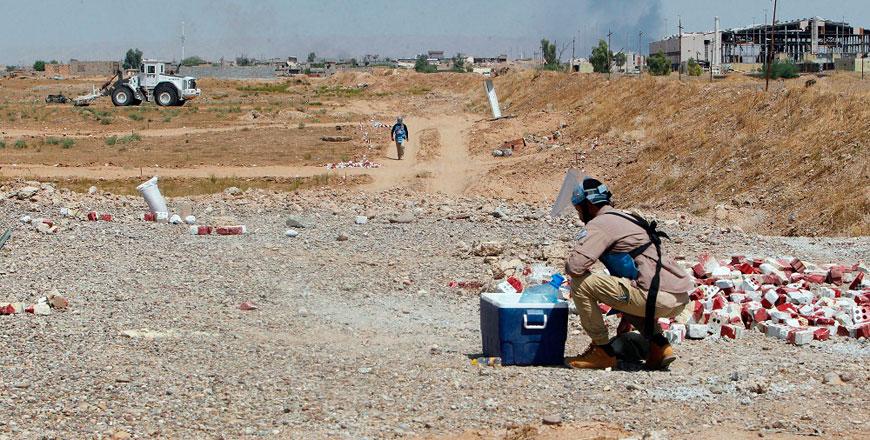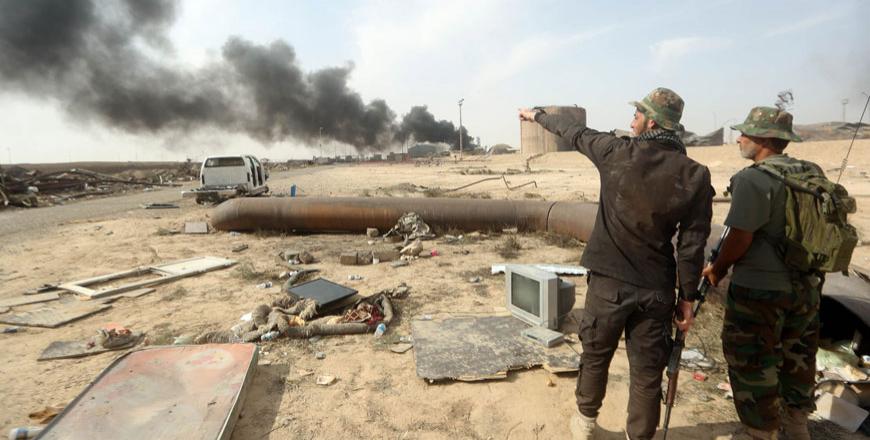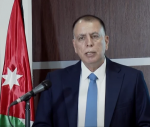You are here
In Iraq’s Baiji, mines turn farms into killing fields
By AFP - Sep 03,2019 - Last updated at Sep 03,2019

Iraqi mine clearers working for Halo Trust, a non-profit organisation specialised in mine removal, scan agricultural and industrial fields on August 25 near Iraq’s Baiji, an oil-rich region ravaged by fighting against Daesh (AFP photo)
BAIJI, Iraq — One man lost his uncle. Another is mourning two sons. Farmers and herders in Iraq's Baiji say mines left by the Daesh group turned their beloved orchards into killing fields.
The improvised explosive devices, planted by extremists trying to fend off Iraqi troops in 2015, have also discouraged scores of families from returning to their battered farming towns around Baiji, in the north of the country.
"Daesh's ghosts are still here. Their crimes are still there, under the earth," said local official Abu Bashir.
His thin face contorted into a grimace as he recalled his personal loss to those "ghosts" — both his sons.
"We came back in March 2018 and found the area booby-trapped. There was nowhere we could feel safe," he told AFP.
"As the kids were playing, a bomb exploded under my six-year-old son who was outside the house. He was killed immediately."
Exactly a year later, in March of this year, unexploded ordnance also killed his 18-year-old son.
He said the experience had left him too scarred to try rebuilding his home, reduced to rubble by ferocious fighting between Daesh and security forces.
"A man bitten by a snake will be afraid of a rope, as the saying goes. After my two boys were killed, I'm afraid of everything."
'This soil means so much'
Lahib, 21, has also been touched by Daesh deadly legacy.
"We got our houses back but the remnants of war are still there. Daesh left us with booby-trapped homes," he told AFP.
"One of these homes blew up on my uncle. I saw it with my own eyes."
The loss pushed him to join Halo Trust, a non-profit group clearing unexploded ordnance in Baiji since June as part of the United Nations' Mine Action Service (UNMAS).
In temperatures reaching 50ºC, Halo Trust mine searchers scanned a field near Baiji for an Daesh specialty: Plastic jerrycans packed with explosives and rigged to pressure plates.
The bombs appeared to have been planted in long rows parallel to a main thoroughfare to defend against incoming Iraqi troops.
Mine searchers used excavators to map out the bombs, then mechanically defused them so Iraqi troops could take the components away.
"When we talk as friends, it's clear no one hasn't seen injustice and explosions with his own eyes. This is why we're doing this job," said Lahib.
In Baiji alone, 340 explosive hazards were removed since UNMAS operations began, with up to 25 IEDs uncovered daily.
UNMAS says the scope and complexity of IED contamination in Daesh-controlled areas is "unprecedented", with tripwires painted to blend in with surroundings and even Iraqi currency turned into bombs.
The fear of undiscovered threats has kept around 100 families away from the area, said Abu Mohammad, another local official.
"People want to come back, live in their homes and get on with normal lives, but when they see that this guy got blown up or that guy was killed, they stay away," he said.
"This soil means so much to us and we hope this kind of thing — losing our loved ones, our children, our homes — doesn't happen on it."
A pulverised moonscape
More than 2,500 people remain displaced from Baiji, according to the International Organisation for Migration.
Returns seem to be speeding up, with some 15,000 people back in their home district since December.
For the most part, however, they are returning to an utterly destroyed moonscape.
The town of Baiji is a labyrinth of mostly-abandoned buildings, still riddled with bullet holes and craters.
Twisted rebar stick out from the ruins like crushed spider legs.
UNMAS hopes clearing Daesh-laden explosives will allow for Baiji's reconstruction, but other challenges remain.
The area is controlled by various Iraqi paramilitary factions that must approve any activity, which aid workers said slows down their work.
"We get authorisation from one group but it doesn't work with the others, so we end up going to four or five different groups before we can start working," one mine removal worker told AFP.
Iraqi parliamentarians from Sunni-majority areas, including Baiji, have also complained that the government has not allocated enough reconstruction funds to the area.
"The problem is huge but the effort to fix it is small," said Iyad Saleh, programme director at Iraqi non-profit group IHSCO.
He spoke on the sidelines of an IHSCO awareness session at a Baiji elementary school, where volunteers showed pupils pictures of IEDs strewn in the dirt and warned them of the gory consequences of touching them.
"If the rate of reconstruction is so weak and slow," said Saleh, "it will take long years to return this area to the way it was before."
By Maya Gebeily
Related Articles
Iraqi forces backed by US-led air strikes cleared the country's largest oil refinery of Daesh terror group, the international coalition helping Baghdad fight the jihadists said on Sunday.
Daesh terror group launched a fresh offensive Thursday against Iraq's largest refinery, where a military official said security forces are facing one of their toughest battles.
BAIJI, Iraq — Iraqi forces advanced on three fronts against the Daesh terror group Sunday, flushing out pockets of resistance in and around
















